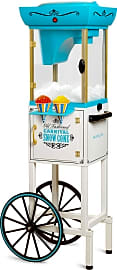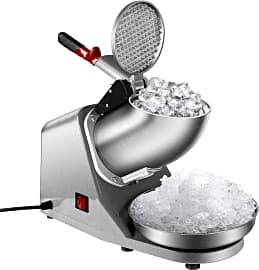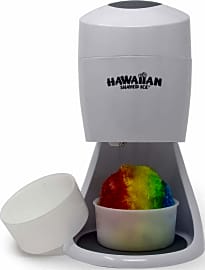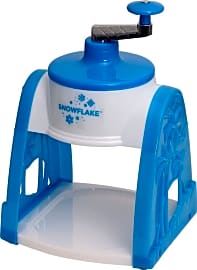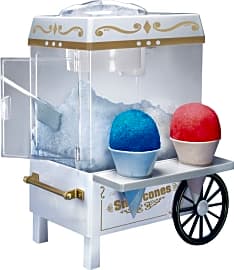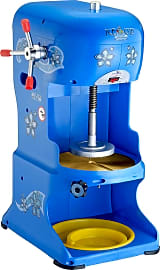The 10 Best Snow Cone Makers

This wiki has been updated 42 times since it was first published in March of 2015. On sweaty summer days, adults and children alike enjoy beating the heat with a delicious snow cone. Thanks to these shaved ice makers, you can enjoy these tasty frozen treats from the comfort of your own kitchen. There are options on our list to fit a variety of occasions, whether you're throwing a child's birthday party, hosting an adult-beverage happy hour, or running your own business. When users buy our independently chosen editorial recommendations, we may earn commissions to help fund the Wiki.
Editor's Notes
December 15, 2020:
If you’ll primarily be using your ice shaver to make snacks for children, the Nostalgia SCM502 is a great kid-friendly choice. It is small enough for kids to reach, and its adorable, vintage design adds a touch of excitement. However, if you really want to wow your kids, the Nostalgia SCC399 is probably the most visually impressive choice on our list. Reminiscent of authentic carnival settings, this full-sized cart is great for dramatic themed events. Due to its height, large rubber wheels, and quality ice shavings, it’s certain to be a memorable part of any birthday party. Alternatively, the VivoHome BY-300 is another smart option for use around children. Though its solid stainless steel exterior lacks the fun colors and whimsy of some other models, it prioritizes safety by automatically powering down when the hatch is opened. This practical feature can help reduce blade-related incidents and give parents peace of mind.
If you want a machine for use in a restaurant or other business, you’ll want one that can stand up to heavy-duty, commercial use, such as the Great Northern Popcorn Premium Shaver. With an rpm of 1725, it’s capable of barreling through 350 pounds of ice per hour. Placing it in a commercial environment will help justify the high price tag, and its bright blue design and fantastical graphics will attract customers. However, it’s also exceptionally heavy, weighing a whopping 55 pounds, so it would be difficult to use in a non-permanent setting. Alternatively, the Little Snowie 2 is relatively light, while still packing a heavy punch. It operates off 1000 watts, yet is much smaller than other industrial models. The Zeny 300B is another smart choice for industrial use. It has a strength of 2000 rpm, so is capable of making treats quickly and efficiently.
If you’re looking for a reasonably priced snow cone maker, the most affordable on our list is the Time For Treats Snowflake VKP1101. It works via hand crank, so you won’t have to worry about access to electricity. Additionally, because it lacks a motor, it weighs just 1.8 pounds, making it a great portable option. However, if you prefer not to shave ice by hand, the electrical Hawaiian Shaved Ice S900A is another cost-friendly choice. Its minimalist style makes a subtle addition to your counter top accessories, and it’s quite easy to use, even for kids.
April 01, 2019:
Once the weather heats up, there's almost no place you wouldn't like to enjoy a snow cone, which is why we included models that are designed for a variety of settings and situations. For festive events, when the showmanship is just as important as the food your machine produces, the Nostalgia SCC399 will turn heads as you roll this charming vintage-looking option around on the large wheels. Should you want something equally as eye-catching and imaginative, but on the smaller side, the counter-top-ready Nostalgia SCM502 is just right. If your family simply fiends for frozen treats all summer long, and you just need a simpler home appliance with few bells and whistles that stores easily, the Hawaiian Shaved Ice S900A is ideal. The Cuisinart SCM-10 and Hawaiian Shaved Ice 3519 are other excellent choices for regular use, at home or in an office. Meanwhile, those serious about making snow cones, and perhaps even those who make a living doing so, will like the impressive, commercial-grade WYZWorks Commercial, or the quick and durable Zeny 300B.
A Simple Beast To Chew Your Ice
Alternatively, it may flow through one of the gaps between the fan blades, hit the ceiling, and come back down.
If you've ever tossed a ball up through the moving blades of a ceiling fan, which is a more popular past time than you might think, you'll have a pretty clear understanding of how a snow cone machine works, and how you can affect its output.
Basically, a shaved ice maker allows you to feed ice through a hopper and press it down into a set of moving blades, where it gets crushed and deposited out the other side into a kind of collection bowl.
Some simple household machines don't come with a compression tool that presses the ice into the blades, which will limit the variety of your ice texture. Remember, finer ice shavings pack more tightly and absorb more of the flavored syrup.
Going back to the ball and fan metaphor, if you throw the ball upward with great force, the ball will likely hit a blade directly and bounce back. Alternatively, it may flow through one of the gaps between the fan blades, hit the ceiling, and come back down.
However, if you throw the ball up with less force, you will increase its hang time in the vicinity of the blades, and one of the blades will catch it just right, sending it flying across the room.
Likewise, if you push ice through the blades of your crusher with greater force, the pieces that come out the other end will be bigger, since there's a greater chance they'll get through with less contact with the blades.
If you apply little to no pressure, the cubes will be more likely to hit the blades as they make their way through the mechanism, resulting in finer ice shavings and contributing to juicier snow cones.
A Slew Of Snow Makers
Let's go back to the ways that a snow cone maker's design might limit your ability to control the consistency of your shaved ice.
Some of the machines in our top five have very convenient press handles that give you more control over that consistency, since the harder you push, the coarser the ice will come out.
However, if you're in need of that kind of speed and strength, there are some commercial options on our list.
In addition, something you might want to consider while comparing machines is the amount of shaved ice you actually need.
If you're making a couple of snow cones at a time for kids who never finish anything you feed them, you might not need a machine that crushes 440 lbs. of ice per hour.
However, if you're in need of that kind of speed and strength, there are some commercial options on our list.
Though the question of quantity is an important one for you to answer, all of the units available here can deliver amazing results and contribute to tasty, refreshing treats.
You can also consider additional features, like the inclusion of a press or the attractiveness of the unit.
Flavor Meets Ice
Samuel Bert invented the first ice crushing machine in 1919, and debuted it that year at the Texas State Fair. However, the origin of the flavored snow cone itself is a bit more slippery. Get it? Ice? Slippery? Okay, moving on.
Bert's snow cones may have been among the first to come from a mechanical device, but balls of shaved ice were consumed with flavored toppings up to 70 years before Bert's invention.
These kids brought the ice shavings home to their mothers, who topped them with a simple custard made from eggs, sugar, and vanilla: the first snow cone topping.
Before the industrial revolution made the manufacture of ice practical, large blocks and quantities of ice were often brought in from the sea and stored in caves, like the one above the Lincoln Tunnel, whose remnants can be seen coming into New York City from New Jersey.
The mid-Atlantic and southern regions of the US eastern seaboard were the best places to market this ice since the climate in those regions is quite warm. While making their journey south, ice transporters in Baltimore, MD and other cities had small crowds of children descend upon them asking for shavings from the ice blocks.
These kids brought the ice shavings home to their mothers, who topped them with a simple custard made from eggs, sugar, and vanilla: the first snow cone topping.
In fact, theaters in Baltimore have some of the earliest evidence of the confection's popularity: signs advising patrons to finish their "snowballs" before returning to the theater for the second act.
Bert's invention, along with other similar patents, made large-scale production of snow cones possible, and the industry was off and running.



